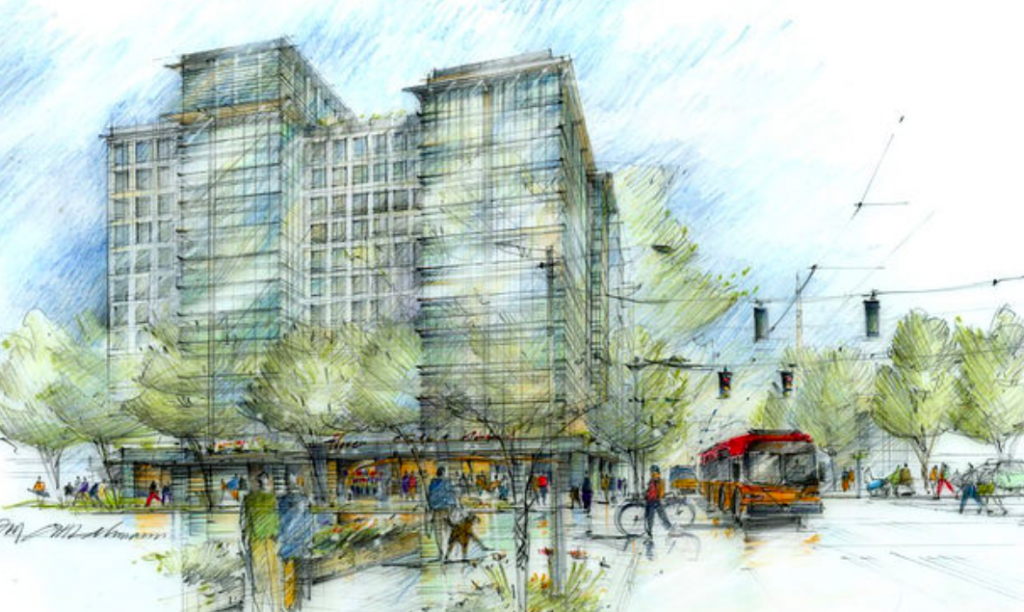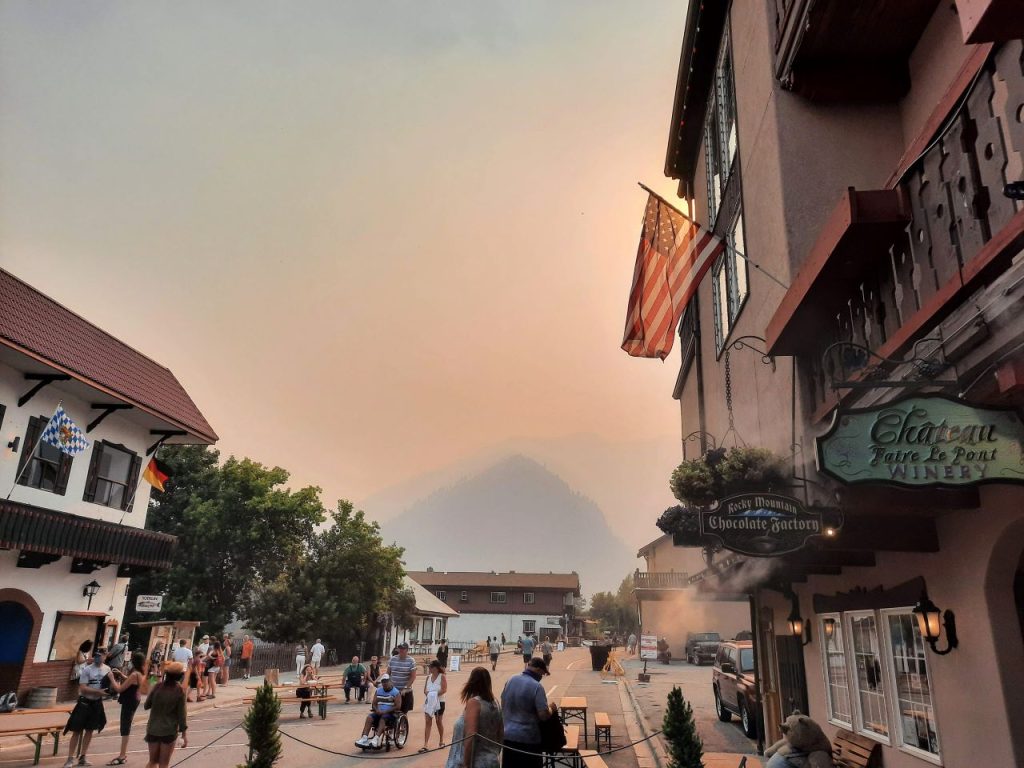
Washington Can’t Wait Week of Action is March 15th-19th.
It’s the third quarter of the Washington Legislative session. The body’s major (self-imposed) hurdle has been crossed, a March 9th deadline where bills must pass out of their house of origin. Now any legislation that is left alive is in the opposite chamber and starts its committee-floor-vote process a second time.
Two important amendments to Washington’s Growth Management Act (GMA) made the cut, passing the House to now begin winding through the Senate. Both bills change how cities and counties will rewrite their comprehensive plans, and by extension change how Washington grows for the next two decades. The Urbanist has endorsed these bills.
Since it was adopted in 1990, the GMA did not include concepts like climate change and environmental justice, or anticipate our increased need for affordable housing. House Bill 1099 adds important environmental components to the GMA, compelling cities and counties to include them in the comp plans. House Bill 1220 does the same for all varieties of housing. Neither is exactly the same as when they were written three months ago.
Futurewise, the statewide nonprofit advocating for sustainable and equitable land use, has been fighting for passage of the two bills. These friends of The Urbanist and all around awesome folks continue the Washington Can’t Wait campaign to emphasize how changes to the GMA are necessary right now in this legislative session. Washington Can’t Wait is running a new Week Of Action March 15th through 19th to press the legislation through the Senate and onto the Governor’s desk.
But it has been a legislative session like no other. The first act of the legislature was to allow all the members to go home and legislate remotely. A move that has left Olympia relatively empty has also turned advocacy on its head.
Jamie Ptacek, lead organizer for the Washington Can’t Wait campaign, sees this challenge. “What organizing tactics are the most impactful? Does it matter that a lot of people sign in pro? Is it more persuasive to submit written testimony? It’s so dependent on the legislator and the committee, which makes it challenging. But legislators are doing a really great job figuring out how to engage with constituents. That’s a challenge that they’re all dealing in different ways to the best of their abilities.”
While the legislators are figuring out how to get their work done, the remote session has withdrawn some barriers to being involved. “People are pretty engaged and excited and excited to see so many progressive environmental and justice bills still alive,” Ptacek said. “They’re excited to keep pushing and see them over the finish line.” In many ways, Washington Can’t Wait’s two priority bills are a testament to that excitement.
House Bill 1220 – Housing and More Housing
The mechanics of HB 1220 are very straightforward. Revised comprehensive plans must already anticipate the number of homes needed to manage growth. HB 1220 requires cities and counties to include homes for moderate, low-, very low-, and extremely low-income households, as well as emergency housing, emergency shelters, and permanent supportive housing. No more trying to solve a housing crisis with just McMansions.
Not only must a city or county plan for a variety of housing, the new law bars most cities from prohibiting emergency housing, supportive housing, and emergency shelters in any zone where short-term rentals are allowed. As Ptacek puts it “at the high level, the bill’s goals and values are that everyone deserves safe and affordable housing.”

Over the course of its time in the house, HB 1220 picked up some amendments. Bryce Yadon, legislative consultant for Futurewise, sees most of the changes as technical. The amendments “make sure that it’s something that cities can accomplish through ordinances and changes, something that they can do through implementation.” For instance, the measurement of “moderate income” was changed in a way that brings it in line with other places in the code. “Most of the changes were just around what verb we were using.”
Two significant additions do appear in the bill going to the Senate. First, the bill calls jurisdictions to look at accessory dwelling units (ADUs) for improving housing stock. Yadon said this amendment came from another bill in the House. It allowed a consolidation of GMA housing issues into a single bill “that will have outcomes without bogging down legislation.”
Second, the original draft had a good long list of ways revised comprehensive plans must “identify local policies and regulations that result in racially disparate impacts, displacement, and exclusion in housing.” This included a review of historical policies, something Yadon calls “a huge shift functionally in how local jurisdictions land use and housing planning.” An amendment adds that the comp plans must go further to establish anti-displacement policies including consideration of investments to housing, inclusionary zoning, tenant protections, and more. The amendment takes anti-displacement from aspiration and puts it into policy.
House Bill 1099 – Fighting Climate Change
The second bill championed by the Washington Can’t Wait campaign, HB 1099, updates the GMA to respond to climate change through statewide targets reducing greenhouse gas emission (GHG) and per capita vehicle miles traveled (VMT). Already, we get into an alphabet soup of acronyms, so this bill naturally had a few more amendments.
To keep it simple, amendments to the bill turned the process of writing climate change policies inside out. This is not a bad thing. It illustrates some of the competing interests at work in this type of legislation.

Originally, HB 1099 directed the state’s Department of Commerce and Department of Ecology to set standards for two things: greenhouse gases and vehicle miles traveled. Jurisdictions would develop policies for meeting these standards as part of their comp plans. These plans would then be tested by Commerce and Ecology to see if they fit their models. Also, those individual policies would be appealable to the state’s Growth Management Hearings Board.
Uncertainty and expense abound. For interconnected jurisdictions like Tacoma and Seattle, who gets the responsibility of which trips was unclear. Each city could write policies that try and meet the set standards, but must wait and see if the state models agree. And then there is still the possibility of appeals. This is difficult and time consuming for large cities, Yadon points out “What about the medium and small jurisdictions? What are our expenses and outcomes? How do we get the coordination without forcing months of work? How do we make that simple for us? How do we get the goals achieved?”
To avoid such pricey and wasteful showdowns, the amended HB 1099 has Commerce and Ecology write an array of policies instead of targets. The policies will be based on what credible science shows will decrease GHG and VMT. Jurisdictions will then choose which policies to adopt as part of their comp plans. Since the policies have been vetted by the state, they can be implemented immediately and will not be subject to environmental appeals under the State Environmental Policy Act.
Instead of rolling the dice at a half price buffet, the amended HB 1099 has upgraded us to a tapas menu. Smaller plates we’re sure are good, less heartburn and no risky shrimp.
But there are still expenses to planning and rulemaking. The amendments to HB 1099 changes when those bills are due, moving some of them forward in order to avoid pricier uncertainty later on. There will be staff hours and expertise required in Commerce and Ecology to develop a list of GHG and VMT rules. This will cost several million dollars in the 2021-2022 biennium. “If we want good work, we should fund good work,” Yadon says. “This is a downpayment.”
Early in the session, Washington Can’t Wait was pursuing a third bill focused on environmental justice. It did not meet submission dates to move forward. But like the anti-displacement language in HB 1220, important environmental justice ideas were included in HB 1099, particularly adding environmental justice as a definition in the GMA, and requiring it be considered in the land use element of comprehensive plans.
And this is not the only activity on the environmental justice front in this year’s legislature. The Healthy Environment for All (HEAL) Act (SB 5141) is moving ahead. While not specifically changing the GMA, the HEAL Act makes a broader move to develop how agencies work with communities most impacted by pollution. Washington Can’t Wait will be supporting the HEAL Act in solidarity with other groups during the upcoming Week of Action.
Week of Action
With the transition of HB 1220 and HB 1099 to the Senate, the campaign is gearing up a new Week of Action running next week: March 15th through March 19th.
The events kick off Monday with a lunchtime update on the legislation, including messages from the bill sponsors and the process of getting through the Senate. Tuesday and Wednesday focus on one of the two bills each day. Thursday offers Solidarity Action Day to hear about priority legislation from Futurewise’s partner organizations like the HEAL Act. And Friday is the Youth Action Hour for young advocates, as well as a Week of Action happy hour. Opportunities will also be available for letter writing, social media bursts, and text banking. More information is available on the WCW sign up and the Facebook page.
While this coming week of action will be intense and the future of the legislation not assured, it does need to be noted how impressive it is to be at this point. Futurewise has assembled a broad coalition of partner groups and regular folks across the state to connect with very forward thinking legislators to develop some novel bills. Having legislation that checks so many boxes on climate change, environmental justice, and deeply affordable housing is impressive. That it’s passed the House is amazing. And for that success, Yadon and Ptacek defer credit from their own hard work.
Yadon recognizes the bills’ sponsors and committee chairs in the house. “Representative Duerr did a lot of stakeholdering with cities and counties and other groups to get a bill that for the most part, with minor tweaks, will be the final bill. Representative Fitzgibbon helped and is a big reason for this went as well. They did the groundwork to get caucus there and get amendments there and get everyone on the same page. The members are putting in the work done.”
Ptacek adds credit for the many constituents who have reached out to their representatives in this weird legislative year. She sees that constituent reach as vital to the bills’ success in the Senate, turning supporters into advocates. “So far we’ve been focused on the House, and now we have to educate the Senate that these bills are coming and have a lot of support. They should be housing and climate justice champions. We are mobilizing constituents to reach out. Not just asking a Senator to vote yes, but actively advocate for these bills and make sure they come up with floor votes.”
Ray Dubicki is a stay-at-home dad and parent-on-call for taking care of general school and neighborhood tasks around Ballard. This lets him see how urbanism works (or doesn’t) during the hours most people are locked in their office. He is an attorney and urbanist by training, with soup-to-nuts planning experience from code enforcement to university development to writing zoning ordinances. He enjoys using PowerPoint, but only because it’s no longer a weekly obligation.


